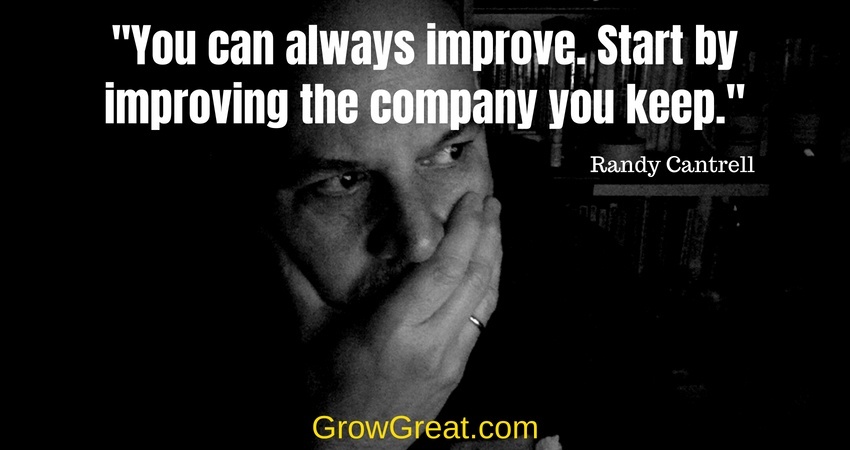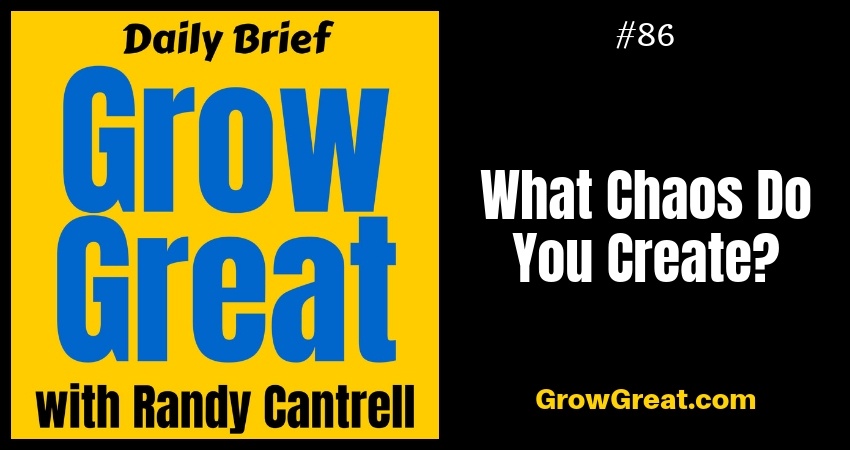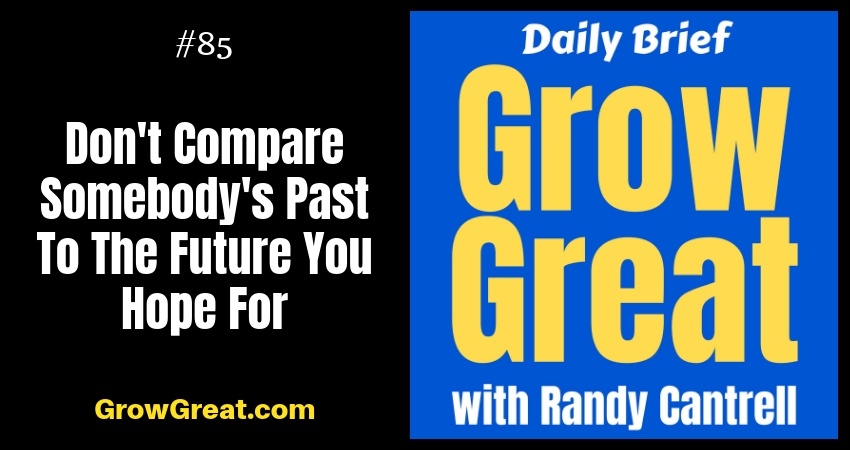Is Entrepreneurship A Birthright Or Is It Learned? – Grow Great Daily Brief #88 – October 23, 2018
Podcast: Play in new window | Download (Duration: 11:16 — 10.8MB)
Subscribe: Apple Podcasts | Spotify | RSS | More

Let me get one thing out of the way. I can’t remember the first time I heard the word, “entrepreneur.” We were “business people.” Period. Or “merchants,” those of us who operated in retailing.
We were anything, but cool. Musicians, writers, and artists were cool. I spent my entire teens, 20’s and 30’s being anything, but cool. New flash: if you’re not cool when you’re a teen, or in your 20’s and 30’s…then you ain’t ever gonna be cool! 😉
I’m good with it.
Some years ago it began to be cool to be an “entrepreneur.” Today, you have to be a “rockstar entrepreneur.” Well, that’s special. Robert Plant and Mick Jagger were (and still are) rockstars, but I didn’t know of any rockstar business people. Okay, that’s not entirely true. In my 30’s I was fascinated by GE’s Jack Welch. I sorta thought Jack was a rockstar. Still do.
That’s just some context that I think is necessary for today’s question: Is entrepreneurship a birthright – meaning you’re born with it – or is it learned?
I think the answer is, “Yes!”
There are stereotypes of everything. Somebody gains popularity telling a story of how they were a child entrepreneur. Suddenly, everybody thinks that’s the path. So some create a fictional version of their own youth in hopes to draw the admiration of others.
Not every successful entrepreneur was born that way, but every successful entrepreneur learned how to operate a business!
Carol Roth wrote a book some years ago (2011) entitled, The Entrepreneur’s Equation: Evaluating the Realities, Risks, and Rewards of Having Your Own Business. She observes that going into business for yourself isn’t the right thing for everybody. Some folks are better off with a job. For the past 20 years or so being an entrepreneur has been cool though. A job? Not so much. The result has been too many people pursuing a path not ideal for them.
Another shift has happened that has nothing to do with being cool. Being old. 😉 Baby boomers with extensive experience and know-how have often found themselves displaced in the workplace. For whatever reasons. Many have found it difficult post-50 to find suitable employment. Some have been forced into entrepreneurship because they’re not financially independent enough to retire so young. Organizations like Encore.org speak to the growing population of older workers who have extraordinary experience and skills.
All this just means the entrepreneurial landscape is constantly changing. It gives rise to the daily conversation about the craft, the craft of entrepreneurship. Are entrepreneurs born or do they learn it?
Human beings are born with some innate tendencies and personality traits, but we’re all born to adapt. The “born” entrepreneurs seem to have been fixated on money at some early age. Maybe it was poverty. Or maybe it was the opposite. Most kids don’t think about making money, just asking for it. It’s curious to me that even self-proclaimed born entrepreneurs don’t focus on the money, but what kid mows lawns or throws paper because they enjoy the “process.” No, we enjoy the payday!
Taking risks. Being assertive. Being communicative. And persuasive. These can be part of our personality, but even these can be learned.
Wikipedia says this…
Entrepreneurship is the process of designing, launching and running a new business, which is often initially a small business. The people who create these businesses are called entrepreneurs.
The dictionary says this…
The owner or manager of a business enterprise who, by risk and initiative, attempts to make profits
If entrepreneurs were born then more teens would operate successful businesses. Plenty of kids are involved in business, some of them quite successful. But there’s always an adult or a crew of adults involved. The 14-year-old YouTube or Instagram star has parents and other adults behind the scenes who understand how business works. Business, like basketball, or playing guitar, is a learned skill. Some of us are athletic. Others of us are creative. Some are musical. A few are all of these and more (they’re the ones we love to hate). All of us have to learn and adapt in order to grow, improve and transform. All of us.
Your entrepreneurship is uniquely your own. I hit RECORD this morning mostly so you’d stop comparing yourself and holding yourself up to some ideal standard based on what you think is culturally true. “Real entrepreneurs are born, not made.” I’m tired of us comparing ourselves with people we think are better. It diminishes the biggest value in all business, putting too much emphasis on money and size. According to one source, there are 28 million businesses in America. 22 million are individually owned without employees. 18,500 are large businesses (defined as companies with over 250 employees). Then there are those rockstar companies like Amazon, Apple, Microsoft and others who occupy so much business press space. The startup world calls them “unicorns.” These are companies who have cracked the billion-dollar mark (in revenues or valuation).
Consider Jeff Bezos, arguably the most successful entrepreneur of today. Back in 2017 he became the world’s wealthiest person with $90 billion. By this past summer (July 2018) his estimated wealth escalated to $150 billion. When he started Amazon with $300,000 borrowed from his parents, do you think he had the innate skills and talent to run a $178 billion empire? Of course not. Nobody is born with the ability or know-how to do that.
He figured it out.
You know who the real entrepreneurs are? They’re people just like you. And me. They’re people who figure it out as they go.
Reid Hoffman co-founded Linkedin. He said, “An entrepreneur is someone who jumps off a cliff and builds a plane on the way down.”
Some people are born to more quickly jump off the cliff. Some are reluctant. Others won’t jump unless they’re pushed.
Some people are born to learn fast. Some learn slower. Others aren’t interested in learning. Still others are just too lazy to learn.
Bottom line: learn what you need to learn to help yourself succeed. Admit you don’t know everything you need to know. Embrace curiosity and learning. Wear those as badges of honor instead of fretting about how smart you look to others. Your entrepreneurship isn’t about how good you are today…it’s about how good are you willing to become.
Hoffman’s quote addresses in a single sentence a variety of things involved. Facing the fear of taking the jump even though you don’t know how things may turn out. There’s faith involved. The belief that you can and will figure it out.
There’s the commitment to do it. Not merely to jump, but to figure it out once you do. It’s not acting blindly. It’s preparing and getting ready, but knowing that you until you start you’re unable to really figure it out. Battle plans all look great inside the tent. Once you hit the battlefield is when you find out who the real generals are though.
There’s the ability to learn on the fly, even in the face of strong adversity. Stop focusing on what you know and get busier learning what you don’t yet know. That doesn’t mean you diminish what you know. It just means you remain focused on your own learning.
And there’s the ever-present requirement we’re all born with, adaptability. Some of us do it better and faster than others, but we’ve all got it. We all learned to walk and talk. Everybody has spent their life figuring things out. Admittedly, some love it more than others. Some are faster at it than others. But we can all do it.
Grow Great is all about helping people figure it out. A decade ago when I began my own entrepreneurial journey as a one-man-band, I didn’t have anything figured out. Sometime this week I’ll share a bit more. But for today, know this. My own figuring it out happened rather recently – just a few years ago. It ignited in me a drive to serve business people – entrepreneurs – because I know the key ingredient to Jeff Bezos’ success (and ours, too). It’s about constant learning and summed up in the phrase I continually use, “figuring it out.” It’s not about other people telling us what to do, or how to do it, but rather it’s about our own ability and willingness to surround ourselves with people who can help us figure it out for ourselves. Our success depends on it. It’s what our entrepreneurial journey is all about.
Be well. Do good. Grow great!







